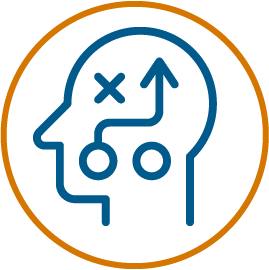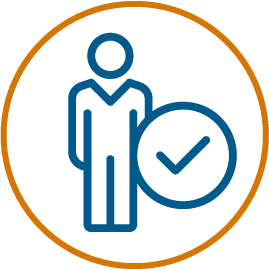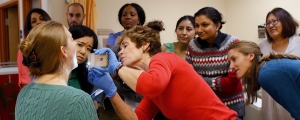Expand your practice with a specialization as a Family Nurse Practitioner in primary care.
Program Type
Graduate Certificate
Semester Start
Fall, Spring
Study Options
Online
Minimum Duration
7 Months
UMass Boston’s Nursing Post-Master’s Certificate (PMC) focuses on preparing you to earn your certification as a Family Nurse Practitioner (FNP) in primary care. It’s designed for master’s prepared Registered Nurses (RNs) who want to become an FNP in primary care and Nurse Practitioners (NPs) who want to add a second certification as an FNP to their résumé. Interactive online learning and clinical coursework will help you develop and expand your skill sets. Use these skills to improve the quality of care you provide and expand your practice so you can provide health care to all populations.
The Nursing PMC program has 12-credit and 21-credit options*. The 12-credit option is open to RNs with MS degrees in nursing and current national certification as family, adult, and pediatric nurse practitioners. Those with women’s health, nurse midwife, neonatal, or acute care NP certifications are considered individually by the program director based on prior master’s level didactic and clinical course work.
The 21-credit option is open to RNs and other certified Advanced Practice Registered Nurses (APRNs), including Certified Nurse-midwives (CNMs) and Clinical Nurse Specialists (CNS); Women’s Health Nurse Practitioners (WHNPs); and Adult-Gerontology Acute Care Nurse Practitioners (AGACNPs) with a Nursing MS degree.
We are currently not accepting applications for the Adult/Gerontological (AGNP) specialization.
Tuition: 12-Credit Program
- The 12-credit option consists of two 3-credit courses, and one 6-credit practicum which includes 300 hours of supervised clinical practice.
- Online tuition is $600 per credit.
- College of Nursing Fee per semester is $700/Fall & Spring.
- Estimated tuition & College of Nurse fee cost* — if courses are completed in one semester — is $7,900.
- Other fees as applicable.
Tuition: 21-Credit Program
- The 21-credit program consists of three 3-credit courses and two 6-credit practicums which include 600 total hours of supervised clinical practice.
- Online tuition is $600 per credit.
- College of Nursing Fee per semester is $700/Fall & Spring.
- Estimated tuition & College of Nursing Fee cost* is $14,700.
- Other fees as applicable.
* Estimate is based on completing the program by minimum duration. Other fees may apply. Request Info to connect with a program representative for further details.
Deadlines
- Applications to start in the fall are due June 15
- Applications to start in the spring are due October 1
Application Checklist
- Prerequisites
Prerequisites to the Post-Master’s program include evidence of graduate level coursework in an APRN program in the “3 P courses.” These courses are advanced health assessment, advanced pathophysiology and advanced pharmacology. To be recognized, the “3 P courses” must have been:- Taken in an APRN track program.
- Earned a letter grade of a B or better, (pass/fail are not acceptable).
- Completed within 5 years of application.
- Equivalent in content and credits (3 credits) to UMass Boston courses.
- Stand-alone courses (i.e., no combination courses, such as pathopharmacology).
- Students have the opportunity to be granted a waiver of prerequisite courses in several ways.
- As noted above with courses taken in an APRN track program, earned a B or better within the past 5 years, 3 credit courses and stand alone.
- A practicing APRN in primary care (PNP, ANP, AGNP) will be granted a waiver as long as the courses were a primary care/internal medicine course (not specific to a population foci) and earned a B or better.
- The APEA test may be taken with a 67% passing grade which demonstrates competency in the 3 P’s and a waiver may then be granted for those prerequisites. If the student does not obtain 67% after three attempts the 3 P’s need to be taken by the student.
- Admission Requirements
Applicants should indicate in their statement of interests and intent whether they are applying to the Family Primary Care Nurse Practitioner (NP) Post Master’s Certificate program of study 12- or 21-credit options. We are currently not accepting applications for the Adult/Gerontological Nurse Practitioner (AGNP) specialization. Only Master’s prepared currently certified adult, pediatric, or gerontology NPs can be considered for acceptance into the 12-credit option.
In addition to the general admission requirements for all graduate studies programs listed in the "Admissions" section of the Graduate Admission Application, prospective students applying to the post master’s nurse practitioner certificate programs must meet the following requirements:
- Official transcripts from all colleges attended
- Personal statement: As a prompt, focus on the following: why you want to pursue graduate studies, why are you interested in pursuing the track (FNP) you are applying for and how will the degree help with your professional and personal goals
- Two professional references
- Current resume/CV
- Bachelor’s degree in Nursing from an accredited program or equivalence coursework; a GPA of 3.0 or better is recommended for admission to the program
- Masters in Nursing from an accredited nursing program
- Current RN license in the state the student lives and completing clinical
- Evidence of national certification for those applying to the 12-credit program
- One year of clinical practice as a nurse practitioner for those applying to the 12-credit program
*Please note that the Nursing PMC program is not available for residents in the following states: Alaska, Arizona, California, Colorado, Iowa, Kansas, Kentucky, Louisiana, New Mexico, New York, Nevada, North Carolina, North Dakota, Ohio, Oklahoma, Oregon, Tennessee, Texas, Virginia, Washington, West Virginia, Wyoming.
12-credit Family Nurse Practitioner (FNP) Certificate Program
Required Course:
- Mental and Psychosocial Health of the Urban Family (NURSNG637)
In this course, you’ll consider multicultural individuals and families at risk for mental and psychosocial problems within the context of urban living. You’ll apply nursing theory and research to developing processes of care for individuals across the lifespan with mental health and psychosocial problems. You’ll learn evidence-based care, including cognitive-behavioral, psychopharmacological, and non-traditional approaches to psychosocial and related physical problems. You’ll also investigate research related to environmental, psychosocial, genetic, economic, family systems, developmental risk factors, drug efficacy, and nonpharmacological approaches for individuals with mental and psychosocial illness. You’ll also explore the impact of contemporary health care policy and legislative proposals on quality, cost, and access to care.
Choose one of two tracks, Primary Care of the Adult or Primary Care of the Childbearing Family:
- Primary Care of Adults (NURSNG639)
This course provides you with knowledge related to the assessment and management of patients with acute and chronic health care problems encountered by nurse practitioners in family practice and adult/gerontological primary care settings. You’ll analyze the direct and indirect components of the nurse practitioner role related to primary health care. You’ll apply evidence-based guidelines and research to support diagnostic, therapeutic, and pharmacological regimens. Emphasis will continue to be placed on the application of culturally sensitive nursing care to a diverse population, where diversity includes age, gender, race, ethnicity, culture, religion, sexual orientation, abilities, and socioeconomic status. - Primary Care of the Adult Practicum (NURSNG670)
Refine your advanced practice skills with further attention to the application of theory and evidence-based knowledge to the role of the family or adult/gerontological nurse practitioner. You’ll examine the assessment, diagnostic, therapeutic, evaluative, consultative, and teaching functions of the nurse practitioner role within a professional, ethical, and legal framework. You’ll continue to gain experience in the assessment and management of health promotion and episodic and chronic illness problems in adults with the supervision of nurse practitioner or physician preceptors, and faculty support. Seminar discussions include an exploration of special topics in disease management to improve quality, access, and cost of primary health care for diverse populations. You’ll also discuss diversity, health care disparities, and ethical issues as they relate to the clinical topics. This practicum includes 300 clinical hours in internal medicine or family practice.
OR
- Primary Care of the Childbearing Family (NURSNG681)
This course builds on human growth and development to focus on acquiring knowledge related to the assessment and management of patients with acute and chronic health care problems encountered by nurse practitioners in family practice and pediatric primary care settings. You’ll analyze problems of pregnant women, infants, children and adolescents within a family nurse practitioner framework for practice. You’ll apply evidence-based laboratory, diagnostic, therapeutic, and pharmacological plans of care to problem management. Continued emphasis is placed on application of culturally sensitive nursing care to a diverse population where diversity includes age, gender, race, ethnicity, culture, religion, sexual orientation, abilities, and socioeconomic status. - Primary Care of the Childbearing Family Practicum (NURSNG682)
Further refine your skills in critical thinking and clinical reasoning. You’ll apply assessment, diagnostic, therapeutic, and health teaching strategies to a continuum of health promotion/illness problems of women, infants, and children. Seminars are grounded in learning the application of theory and research to the domains of practice of the family nurse practitioner with emphasis on the management of patient health and illness and the teaching-coaching function of the nurse practitioner in the specialty of pediatrics and obstetrics. You’ll develop role competencies under the supervision of nurse practitioner preceptors and faculty in urban health care settings. Seminar discussions include an exploration of special topics in disease management to improve quality, access, and cost of primary health care for diverse populations (or communities) with an emphasis on underserved populations where diversity includes age, gender, race/ethnicity, culture, religion, language, sexual orientation, abilities, and socioeconomic status. This practicum includes 300 clinical hours.
21-credit Family Nurse Practitioner (FNP) Certificate Program
- Mental and Psychosocial Health of the Urban Family (NURSNG637)
In this course, you’ll consider multicultural individuals and families at risk for mental and psychosocial problems within the context of urban living. You’ll apply nursing theory and research to developing processes of care for individuals across the lifespan with mental health and psychosocial problems. You’ll learn evidence-based care, including cognitive-behavioral, psychopharmacological, and non-traditional approaches to psychosocial and related physical problems. You’ll also investigate research related to environmental, psychosocial, genetic, economic, family systems, developmental risk factors, drug efficacy, and nonpharmacological approaches for individuals with mental and psychosocial illness. You’ll also explore the impact of contemporary health care policy and legislative proposals on quality, cost, and access to care. - Primary Care of Adults (NURSNG639)
This course provides you with knowledge related to the assessment and management of patients with acute and chronic health care problems encountered by nurse practitioners in family practice and adult/gerontological primary care settings. You’ll analyze the direct and indirect components of the nurse practitioner role related to primary health care. You’ll apply evidence-based guidelines and research to support diagnostic, therapeutic, and pharmacological regimens. Emphasis will continue to be placed on the application of culturally sensitive nursing care to a diverse population, where diversity includes age, gender, race, ethnicity, culture, religion, sexual orientation, abilities, and socioeconomic status. - Primary Care of the Adult Practicum (NURSNG670)
Refine your advanced practice skills with further attention to the application of theory and evidence-based knowledge to the role of the family or adult/gerontological nurse practitioner. You’ll examine the assessment, diagnostic, therapeutic, evaluative, consultative, and teaching functions of the nurse practitioner role within a professional, ethical, and legal framework. You’ll continue to gain experience in the assessment and management of health promotion and episodic and chronic illness problems in adults with the supervision of nurse practitioner or physician preceptors, and faculty support. Seminar discussions include an exploration of special topics in disease management to improve quality, access, and cost of primary health care for diverse populations. You’ll also discuss diversity, health care disparities, and ethical issues as they relate to the clinical topics. This practicum includes 300 clinical hours in internal medicine or family practice. - Primary Care of the Childbearing Family (NURSNG681)
This course builds on human growth and development to focus on acquiring knowledge related to the assessment and management of patients with acute and chronic health care problems encountered by nurse practitioners in family practice and pediatric primary care settings. You’ll analyze problems of pregnant women, infants, children and adolescents within a family nurse practitioner framework for practice. You’ll apply evidence-based laboratory, diagnostic, therapeutic, and pharmacological plans of care to problem management. Continued emphasis is placed on application of culturally sensitive nursing care to a diverse population where diversity includes age, gender, race, ethnicity, culture, religion, sexual orientation, abilities, and socioeconomic status. - Primary Care of the Childbearing Family Practicum (NURSNG682)
Further refine your skills in critical thinking and clinical reasoning. You’ll apply assessment, diagnostic, therapeutic, and health teaching strategies to a continuum of health promotion/illness problems of women, infants, and children. Seminars are grounded in learning the application of theory and research to the domains of practice of the family nurse practitioner with emphasis on the management of patient health and illness and the teaching-coaching function of the nurse practitioner in the specialty of pediatrics and obstetrics. You’ll develop role competencies under the supervision of nurse practitioner preceptors and faculty in urban health care settings. Seminar discussions include an exploration of special topics in disease management to improve quality, access, and cost of primary health care for diverse populations (or communities) with an emphasis on underserved populations where diversity includes age, gender, race/ethnicity, culture, religion, language, sexual orientation, abilities, and socioeconomic status. This practicum includes 300 clinical hours.
At the end of this four- to eight-month program, you’ll be awarded a post-master’s certificate in Nursing. The certificate will demonstrate your expertise in the field on your résumé, as well as in interviews and workplace evaluations. Apply the skills learned in the program to get certified* as a Family Nurse Practitioner in primary care.
*Please note that the Nursing PMC program is not available for residents in the following states: Alaska, Arizona, California, Colorado, Iowa, Kansas, Kentucky, Louisiana, New Mexico, New York, Nevada, North Carolina, North Dakota, Ohio, Oklahoma, Oregon, Tennessee, Texas, Virginia, Washington, West Virginia, Wyoming.
UMass Boston programs are designed to meet the requirements for licensure or certification in Massachusetts. Please contact your state licensing or certification board to determine whether a program meets the requirements for licensure or certification in other states. You may also contact us with any questions.
Recent Graduates
Employers include:





Why UMass Boston Online?
Value
Among the lowest online tuition rates of an accredited, public research university.
Flexibility
Study full-time to finish fast, or part-time to suit your schedule. Live sessions scheduled with the working professional in mind.
Authenticity
The same courses taught by the same academic departments as on campus. No third-party providers.
Learn More






